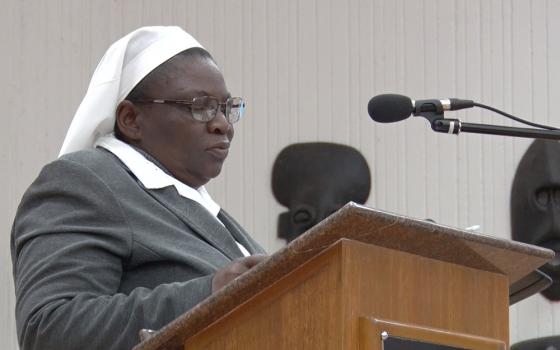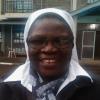In Zimbabwe we are preparing for elections on July 30. In past decades we have had problems of violence during elections.
In collaboration with the African Forum for Catholic Social Teaching, I gave a public seminar on July 4 at Arrupe Jesuit University, exploring the theme of "Searching for the common good through the election processes: hope for a new Zimbabwe." Its purpose was to encourage and motivate our people to vote for a leader with the view of the common good at heart.
African Forum for Catholic Social Teaching and Arrupe University thanked me for helping them create space for theological reflection and debate; Global Sisters Report asked me to share a summary of my personal reflections on that experience. They thought that citizens of all nations might benefit — so I suggest you substitute the name of your own nation for "Zimbabwe"!
As I developed this, my thoughts were influenced by the social teaching of the Catholic Church, Pope Francis, Mary Ward, St. Ignatius of Loyola and Otto Scharmer.
The Second Vatican Council defined the common good as "the sum total of social conditions which allow people, either as groups or as individuals, to reach their fulfillment more fully and more easily." It is about the progress of persons.
I was aware that there were some important voices of citizens who were not going to be able to be there. So I visited some of them in the streets and asked them what they think about the common good. This is what they said:
Our common good is having access to cash;
Our common good is having enough to eat;
Our common good is having access to water, housing and education;
Our common good is having good roads;
Our common good is having access to health services;
Our common good is respect for life, dignity, rights and freedom;
Our common good is peace, security and stability;
Our common good is having a clean environment and flourishing of the entire Zimbabwe nation;
Our common good is having jobs;
Our common good is redressing the source of poverty in our country;
Our common good is uprooting marginalization and inequalities;
Our common good is having a new Zimbabwe where we all can develop and grow.
To be a citizen of Zimbabwe is to care for the common good and not just "my good." I believe that being a good citizen means voting for and supporting programs, initiatives, laws and governments that make us all better in character, and that engage us in the new Zimbabwean dream of peace, justice and prosperity for all.
If we really want to "make it" in Zimbabwe, it now takes not only hard work, but also the support of others — not just friends and family, but all. Pope Francis encourages us to think of those on the margins. That's what the common good is all about: everyone working together as a community, to try to lift each other up.
We have to "co-search" together, for we are a connected people. I think we simply cannot sit out this election. Rather, we must look beyond our own rights, interests and religions and cast a vote for the common good. As we move closer to the 2018 election, let us encourage people not to vote according to self-interest, but with a view to the common good.
With the common good as the goal, and the election as the "process," you and I must be the "who," the co-searchers.
Our role must be to go deeper to our inner source, and discern, reflect and pray. Then ask ourselves:
What matters most to me in Zimbabwe?
What is my role in promoting the common good?
Who are we?
Who benefits? Who is marginalized? Who suffers?
What is God saying to us?
What can we let go?
What can we let come?
Prayer is how God takes us to new places of grace. While exiled with the Jewish people in Babylon, Nehemiah hears that the wall of Jerusalem is in ruins. His immediate response is to fast and pray (Nehemiah 1:4).
God then gives him direction through the personal interest and response of the Persian king Artaxerxes. All the while, Nehemiah continues to pray (2:1-6). As the rebuilding begins in Jerusalem, he encounters opposition from Israel’s enemies.
Nehemiah immediately gathers the exiles who have returned with him. What does he want them to do together? Pray! (4:3-9).
God then directs them to divide the people into those who will work on the wall and those who will guard the workers (4:16). Prayer discovers what action to take.
So this election gives us an opportunity to reflect on the best possible political leaders who have the common good at heart, and then cast our vote through discernment, reflection and prayer.
Otto Scharmer's Theory U proposes that the quality of the results that we create in any kind of organization or system is a function of the quality of awareness and attention of consciousness that the participants in the organization operate from.
This July, we have the opportunity to shape the direction of our nation, in the voting box. One of the most significant forms of citizen participation is exercising the right to vote. Voting is an important part of our obligation.
In Zimbabwe, the responsibility for our government's direction lies with us, as citizens, and we can’t take that responsibility lightly. Nor can we — because of apathy, discouragement, fear or previous experiences — abandon our obligation to vote. When we vote, we do so in order to promote the common good, to express it, advance it and protect it.
Elections are a human right, and to elect is to open the door to the future, to the new Zimbabwe, to the common good. We must be aware of the need and importance of a participatory and responsible electoral process, because its end is the common good of society.
Through this 2018 election, we are looking ahead with hope for a new Zimbabwe. Invite your family and friends — all children, men and women of Zimbabwe — to pray for a peaceful and clean election, and a nation in which all people live in peace with access to social services.
God indeed intervenes in the affairs of nations (2 Chronicles 7:14). The Zimbabwe Catholic Bishops' Conference encouraged us in a recent pastoral letter to pray for peaceful elections.
The apostle Paul wrote, "I urge, then, first of all, that petitions, prayers, intercession and thanksgiving be made for all people— for kings and all those in authority, that we may live peaceful and quiet lives in all godliness and holiness" (1 Timothy 2:1-2).
Let us, dear friends, pray for our beautiful nation, Zimbabwe.
[Mercy Shumbamhini belongs to the Congregation of Jesus. She is regional director of her congregation and president of the Conference of Major Superiors in Zimbabwe.]

